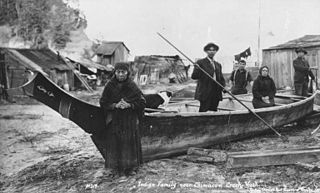
The Klallam are a Coast Salish people Indigenous to the northern Olympic Peninsula. The language of the Klallam is the Klallam language, a language closely related to the North Straits Salish languages. The Klallam are today citizens of four recognized bands: Three federally-recognized tribes in the United States and one band government in Canada. Two Klallam tribes, the Jamestown S'Klallam and Lower Elwha Klallam, live on the Olympic Peninsula, and one, the Port Gamble S'Klallam, on the Kitsap Peninsula in Washington state. In Canada, the Scia'new First Nation is based at Becher Bay on southern Vancouver Island in British Columbia.
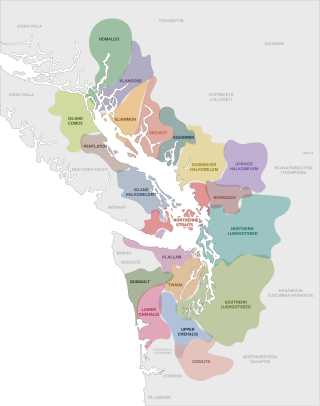
The Coast Salish languages, also known as the Central Salish languages, are a branch of the Salishan language family. These languages are spoken by First Nations or Native American peoples inhabiting the Pacific Northwest, in the territory that is now known as the southwest coast of British Columbia around the Strait of Georgia and Washington State around Puget Sound. The term "Coast Salish" also refers to the cultures in British Columbia and Washington who speak one of these languages or dialects.
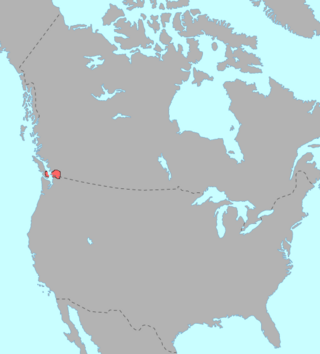
Halkomelem is a language of various First Nations peoples of the British Columbia Coast. It is spoken in what is now British Columbia, ranging from southeastern Vancouver Island from the west shore of Saanich Inlet northward beyond Gabriola Island and Nanaimo to Nanoose Bay and including the Lower Mainland from the Fraser River Delta upriver to Harrison Lake and the lower boundary of the Fraser Canyon.

Klallam,Clallam, Ns'Klallam or S'klallam, is a Straits Salishan language historically spoken by the Klallam people at Becher Bay on Vancouver Island in British Columbia and across the Strait of Juan de Fuca on the north coast of the Olympic Peninsula in Washington. The last native speaker of Klallam as a first language died in 2014, but there is a growing group of speakers of Klallam as a second language.
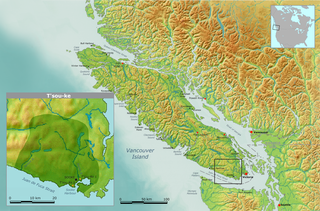
The T'sou-ke Nation of the Coast Salish peoples, is a band government whose reserve community is located on Vancouver Island, in the province of British Columbia, Canada. In February 2013, the T'sou-ke Nation had 251 registered members, with two reserves around the Sooke Basin on the Strait of Juan de Fuca at the southern end of Vancouver Island, with a total area of 67 hectares. The T'Souk-e people are the namesake of the town of Sooke, British Columbia and its surrounding harbour and basin.
The Cheam Indian Band is a First Nations band government of the Stó:lō people in the Upper Fraser Valley region of British Columbia, Canada, located near the community of Rosedale. They traditionally speak the Upriver dialect of Halkomelem, one of the Salishan family of languages. The name Cheam means "wild strawberry place" and is the namesake of Mount Cheam, which overlooks the community and most of the Upper Fraser Valley. They are a member government of the Sto:lo Tribal Council, one of two Sto:lo tribal councils.
Naut’sa mawt Tribal Council is a First Nations Tribal Council located in British Columbia, Canada, with offices in Tsawwassen and Nanaimo. NmTC advises and assists its 11-member Nations in the areas of Community Planning, Economic Development, Financial Management, Governance and Technical Services NmTC is also actively involved in fostering dialogue and understanding between its members and their neighbouring communities.

The Tsawwassen First Nation is a First Nations government whose lands are located in the Greater Vancouver area of the Lower Mainland of British Columbia, Canada, close to the South Arm of the Fraser River and just north of the international boundary with the United States at Point Roberts, Washington. Tsawwassen First Nation lists its membership at 491 people, nearly half of whom live on the lands.

The Halalt First Nation is a First Nations tribe located on a reservation on the Chemainus River in southeastern Vancouver Island, British Columbia, Canada. The Halalt were originally from the village xeláltxw once located in the Cowichan Valley, and likely moved to Willy Island, the largest of the Shoal Islands, in the early 19th century.
Malahat First Nation is a Coast Salish First Nations community of W̱SÁNEĆ representing approximately 350 members with two reserve lands located on the western shore of Saanich Inlet, Vancouver Island in British Columbia, Canada. The Malahat First Nation is one of many nations within the Coastal Salish group that live on their traditional lands. The Coastal Salish are Indigenous to the Northwest mainland, coast, and islands. The Malahat First Nation is a member nation of the Naut'sa mawt Tribal Council and was the ninth First Nation in Canada to be certified by the First Nations Financial Management Board. The ancestral languages of Malahat Nation are Hul̓q̓umín̓um̓ and SENĆOŦEN. The Hul̓q̓umín̓um̓ or Halkomelem language is spoken in Washington State and British Columbia and is within the Coastal Salish language family. Currently it is being revitalized, as it is mainly spoken by elders in the community. The Chief of Malahat Nation is George Harry. George served on the council for four years before being elected as Chief on June 10, 2019.
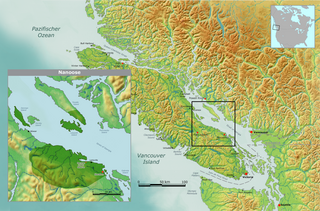
The Nanoose First Nation, also known the Snaw-naw-as First Nation, is a First Nations government located on central Vancouver Island in southwestern British Columbia, Canada, in the vicinity of the community of Nanoose Bay. They are Coast Salish people, and one of the most northern tribes on the east side of Vancouver Island. They speak Hul’q’umi’num’, which is 1 of 3 branches of the Halkomelem dialect spoken from Nanoose to Oregon.

The Lekwungen or Lekungen nation are an Indigenous North American Coast Salish people who reside on southeastern Vancouver Island, British Columbia in the Greater Victoria area. Their government is Songhees First Nation, a member of the Te'mexw Treaty Association and the Naut'sa Mawt Tribal Council. Their traditional language is Lekwungen, a dialect of the North Straits Salish language.
The Lake Cowichan First Nation, government and reserve is located in Lake Cowichan, British Columbia.
The Matsqui First Nation is the band government of the Matsqui people, a Sto:lo Aboriginal group located in the Central Fraser Valley region, at Matsqui, in the northern part of Abbotsford, British Columbia, Canada. They are a member government of the Sto:lo Nation tribal council.
The Tzeachten First Nation is a band government of the Sto:lo people located in the Upper Fraser Valley region near Chilliwack, British Columbia, Canada. They are a member government of the Sto:lo Nation tribal council.
The Yakweakwioose First Nation or Yakweakwioose Band is a band government of the Sto:lo people located in the Upper Fraser Valley region at Sardis, near Chilliwack, British Columbia, Canada. They are a member government of the Sto:lo Nation tribal council.
The Te'mexw Treaty Association handles Treaty negotiations in the BC Treaty Process for a number of First Nations located in the northern Strait of Georgia of British Columbia. The members of the association are former signatories of the Douglas Treaties, a group of treaties signed in the 1850s.
The Pauaquachin are a Coast Salish indigenous people whose territory is in the Greater Victoria area of southern Vancouver Island, British Columbia, Canada. Their houses stand between Gordon Head and Cowichan Head. They are one of the five groups of houses or 'families' of Saanich, along with the Tsawout, the Tseycum, the Malahat, the T'sou-ke, and the Tsartlip First Nations. According to a 2016 census, 330 people were recognized as Pauquachin.

T'Sou-ke, also known as Sooke, is the dialect of the North Straits Salish language spoken by the T'Sou-ke people of Vancouver Island in British Columba. As of 2014, there were no fluent speakers, although there were at least ten speakers remaining who could somewhat speak and understand the language.











